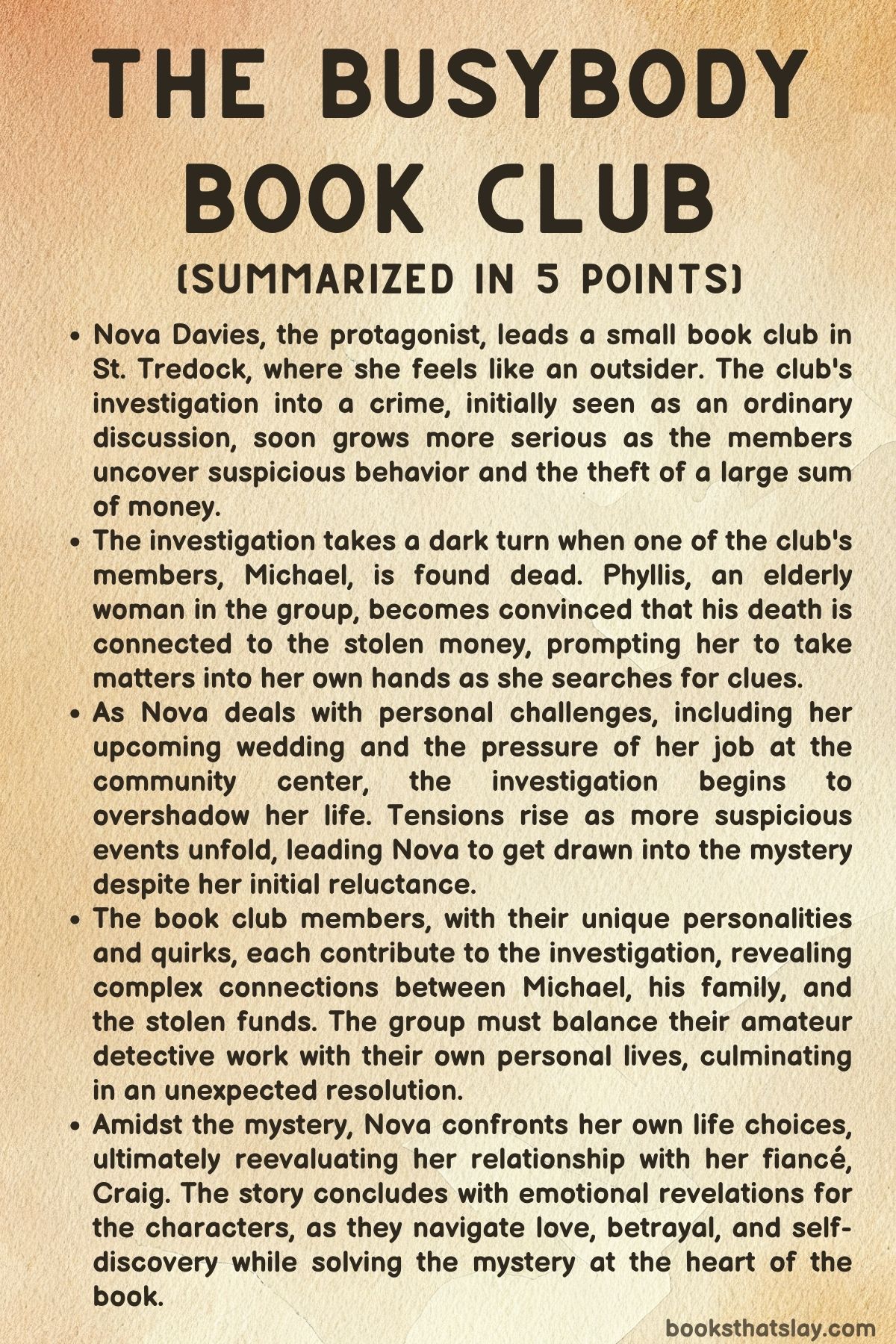The Busybody Book Club Summary, Characters and Themes
The Busybody Book Club by Freya Sampson is a charming and quirky mystery novel that blends amateur sleuthing with personal drama. Set in the small village of St. Tredock, it follows Nova Davies, a woman who moves from London and struggles to find her place in the tight-knit community.
Her routine life takes an unexpected turn when the book club she attends gets involved in a murder investigation. As the characters dig deeper into the mystery, they uncover not only hidden secrets in the village but also navigate their own personal issues, making the investigation all the more complex. A delightful mix of intrigue, personal growth, and mystery, The Busybody Book Club offers readers a compelling story filled with twists and endearing characters.
Summary
Nova Davies, the protagonist of The Busybody Book Club, calls an emergency meeting of her quirky book club, which is made up of Phyllis, Arthur, Ash, and a few other villagers. At the start of the book, Nova is working at the St.
Tredock Community Center, which is struggling with poor attendance at her book club meetings. Though she has only recently moved from London, Nova is trying to settle into village life, but she often feels out of place.
The members of the book club seem like an eccentric group, each with their own personality, and it’s during one of their meetings that the investigation begins.
The group is caught off guard when a new member, Michael, joins the meeting. He is quiet and reserved, his awkwardness contrasting with the usual dynamic of the club.
The members discuss the book of the month, Where the Crawdads Sing, but Michael’s strange exit from the meeting raises some suspicions. Nova begins to feel uneasy about his behavior, and as the meeting continues, tensions rise.
The following day, Nova is shocked to learn that a large sum of money meant for roof repairs at the community center has gone missing. This theft coincides with Michael’s sudden and strange departure, making him the prime suspect.
The police confirm that no one entered or left the building other than the club members, narrowing the suspect list. However, things take a dark turn when Michael is found dead.
Phyllis, an avid fan of Agatha Christie novels, is convinced that Michael’s death is connected to the stolen money and begins her own investigation. She believes that Michael may have been murdered to cover up the theft, a theory that she takes very seriously.
As the investigation deepens, more secrets begin to surface, including the involvement of Michael’s family in the crime.
As Nova tries to juggle the investigation with her personal life, including the impending wedding to her fiancé, Craig, she finds herself questioning everything around her. She becomes increasingly involved in the case, torn between her professional duties and the growing chaos around her.
Her investigation leads to more shocking discoveries, including the revelation of a second body, and she begins to feel the weight of the mystery on her shoulders.
While Nova struggles with her own wedding plans, Phyllis continues to piece together the mystery. She suspects that Cynthia Watkins, Michael’s mother, might have been involved in his death and the theft, but the pieces don’t seem to add up.
Meanwhile, Nova faces more personal struggles, including her relationship with Craig. She becomes more uncertain about her future with him and what she truly wants in life.
This personal turmoil adds another layer to the already complex investigation.
Phyllis’s amateur detective work uncovers a shocking connection between Michael’s death and his family. She believes that Michael might have been driven to commit murder due to his financial troubles, including a large amount of debt.
The deeper Phyllis digs into the case, the more she suspects that Michael’s mother, Cynthia, might have been involved in the crime. Her suspicions only intensify as she uncovers a series of lies and suspicious behavior from those close to Michael, including his family and friends.
As Phyllis continues her investigation, Nova finds herself caught in the middle of it all. She is unsure about how to proceed, especially when her own role in the community and her relationships start to fall apart.
Despite her reluctance, Nova becomes increasingly entangled in Phyllis’s theories and feels the weight of the mystery pressing on her. The stakes are raised when Phyllis makes a startling discovery about Michael’s finances, linking him to the theft and suggesting that his death was part of a larger criminal plot.
Throughout the story, the relationships between the characters evolve. Arthur, a wise and kind figure in the book club, helps Nova navigate her personal struggles.
He shares his own experiences of love and loss, offering her valuable advice. As Nova questions her relationship with Craig, she begins to reflect on her own desires and needs.
This journey of self-discovery is intertwined with the investigation, and as the mystery unravels, Nova learns more about herself and what she truly wants from life.
Phyllis, meanwhile, uncovers more information that confirms her suspicions about Michael’s death. She learns that Richard, Eve Watkins’ neighbor, played a key role in Eve’s murder.
His financial manipulations and greed led to her untimely death, and when confronted, Richard confesses. As the truth about Eve’s death comes to light, the investigation reaches its conclusion.
The stolen money is recovered, and Nova’s name is cleared, though the consequences of the investigation leave lasting emotional scars on everyone involved.
The resolution of the case brings a sense of closure, but it also forces the characters to face difficult truths about themselves. Nova calls off her wedding to Craig after realizing that it was not the life she wanted.
Phyllis’s role as an unconventional detective is solidified, and the group of book club members comes together to celebrate Phyllis’s birthday, marking a turning point for each character. The book ends with a sense of redemption and self-discovery, as Nova, Phyllis, and the others reconcile their pasts and begin anew, leaving behind the chaos and uncovering the truth.
The final chapters offer a bittersweet conclusion that ties up both the mystery and the personal growth of the characters, highlighting the importance of friendship, self-awareness, and the courage to make difficult choices.

Characters
Nova Davies
Nova is the protagonist of The Busybody Book Club, and much of the narrative revolves around her personal and professional challenges. Nova’s story begins with her trying to adjust to life in the small village of St.
Tredock after moving from London. As she navigates her new environment, she often feels like an outsider, disconnected from the community.
Despite this, she finds solace in her involvement with the local book club, a quirky group that provides both comfort and conflict. Nova is determined to make the book club a success, but her engagement with the club deepens when a murder and theft unfold, pushing her into a role she never expected—an amateur detective.
Throughout the story, Nova is torn between her duty to investigate the mystery and her upcoming wedding. Her journey is not just about solving the crime but also about self-discovery.
She grapples with the idea of living for others, particularly in her relationship with her fiancé, Craig. As the investigation progresses, Nova confronts her own desires and ultimately decides to call off her wedding, realizing that the life she was about to enter was not one she truly wanted.
Phyllis
Phyllis is an elderly, sharp-witted member of the book club, and she takes on the role of an amateur detective when the murder and theft in St. Tredock come to light.
Her love for Agatha Christie novels and her keen observational skills make her the natural leader in the investigation. Phyllis is not easily swayed by the opinions of others and is relentless in her pursuit of the truth.
She suspects that the young man Michael is behind the crime and is determined to uncover his secrets, even if it means putting herself in danger. Throughout the story, Phyllis is driven not only by the need to solve the crime but also by a deep-seated loneliness.
Her introspective moments reveal her struggles with aging, and she finds herself longing for companionship. Her persistence in the investigation, especially in the face of doubts from others, highlights her strength and determination.
Phyllis’s character also evolves as she deals with personal emotions, particularly after she begins to form a romantic interest in Richard, a man she meets during the funeral of Eve Watkins. Her character arc reflects themes of resilience, love, and the power of personal conviction.
Arthur
Arthur is another key member of the book club and serves as a calm, thoughtful presence in the story. He is supportive of both Nova and Phyllis, though he is less involved in the investigation compared to Phyllis.
Arthur’s background and personal history unfold gradually, revealing him to be a man of deep emotion, particularly in his reflections on the death of his wife, Esi. This loss has shaped him into the person he is, and through his conversations with Nova, Arthur imparts wisdom about life, love, and relationships.
His quiet, steady demeanor contrasts with the more dynamic personalities around him, but he provides a grounding influence, especially for Nova as she navigates her emotional turmoil about her wedding. Arthur’s interactions with Ash, a teenager in the book club, also highlight his nurturing nature, offering advice on matters of the heart and personal growth.
By the end of the story, Arthur’s relationship with the group strengthens, and he plays a pivotal role in helping Nova gain clarity about her life choices. His character represents the importance of patience, understanding, and the quiet wisdom that comes with age.
Ash
Ash is a younger member of the book club, and his storyline offers a fresh, relatable perspective on the events unfolding in St. Tredock.
As a teenager, Ash is still grappling with issues of identity, love, and personal growth. His crush on a popular boy, Dan, serves as a poignant subplot that explores the complexities of adolescent emotions.
Despite his age, Ash proves to be a thoughtful and insightful character, bonding with Arthur over literature and learning from his experiences. Ash’s involvement in the investigation, though not as pronounced as Phyllis’s or Nova’s, helps to bring a sense of lightness to the narrative.
His journey is one of self-discovery, as he navigates the awkwardness of teenage crushes and tries to understand the adult world around him. By the end of the story, Ash grows in maturity, learning valuable lessons from the older members of the book club, particularly Arthur.
His character provides a youthful counterbalance to the more experienced perspectives in the group and underscores the theme of personal growth throughout the novel.
Michael Watkins
Michael is a central figure in the mystery surrounding the theft and murder in The Busybody Book Club. Initially, Michael is presented as a quiet, seemingly detached new member of the book club.
His odd behavior during meetings, particularly his abrupt departure, raises suspicions among the other club members, especially Phyllis. As the investigation into the theft of community center funds unfolds, Michael becomes the primary suspect.
However, his connection to the crime is more complex than it first appears. As details emerge, it becomes clear that Michael is dealing with his own troubled past, including the unresolved death of his mother, Eve Watkins.
His involvement in the theft and his subsequent disappearance add layers of intrigue to the story, as it is revealed that Michael might be hiding a deeper, more sinister secret. His character reflects themes of guilt, shame, and the search for redemption, as he struggles with the truth about his mother’s death and his own innocence.
Michael’s arc is one of self-realization, as he confronts his past and comes to terms with the consequences of his actions.
Craig
Craig is Nova’s fiancé and plays a significant role in the personal drama of the story. His relationship with Nova is strained as she becomes increasingly distracted by the unfolding mystery and her growing doubts about their future together.
Craig represents the pressure of societal expectations and the traditional path that Nova feels she is supposed to follow, particularly in terms of marriage. Throughout the story, Craig grows frustrated with Nova’s preoccupation with the investigation and the various crises surrounding the community center.
Their strained relationship highlights Nova’s internal conflict and the theme of self-discovery. Craig’s eventual role in the story serves as a catalyst for Nova’s decision to call off their wedding, as she realizes that she has been living for others rather than for herself.
Craig’s character, though not as deeply explored as some of the others, serves as a symbol of the life Nova feels she is expected to lead, one that she ultimately rejects in favor of pursuing her own happiness.
Themes
Identity and Self-Discovery
Throughout The Busybody Book Club, Nova’s journey is deeply intertwined with the theme of identity and self-discovery. Moving from London to the village of St.
Tredock, she initially feels like an outsider, struggling to find a place in her new community. As she navigates the investigation and the intricacies of village life, Nova begins to confront the larger questions about her own identity.
She is forced to reflect on who she truly is beyond her role as a bride-to-be and an employee at the community center. Her relationship with Craig, her fiancé, acts as a key component of this internal struggle.
As her wedding day draws closer, Nova’s growing realization that she might be living her life to meet others’ expectations instead of her own leads to a profound moment of self-reflection. Her ultimate decision to call off the wedding highlights her emotional growth.
This pivotal moment is a culmination of Nova learning to prioritize her own happiness over the life others have imagined for her, a theme that underscores the importance of authentic living and the complexities of self-realization. Nova’s character arc demonstrates how an individual’s journey of self-discovery can be both painful and liberating, especially when confronted with personal dilemmas that challenge societal and familial expectations.
Friendship and Community
In The Busybody Book Club, the theme of friendship and community plays a significant role, especially in how the quirky members of the book club come together to support each other despite their differences. The relationship between Nova, Phyllis, Arthur, and Ash is foundational to the novel, showing how bonds formed in unexpected circumstances can grow into something deeply meaningful.
The book club itself, though small and seemingly insignificant, becomes a space where each member finds not only intellectual companionship but also emotional support. Phyllis, for example, acts as the glue that holds the group together with her unwavering dedication to the truth, while Arthur provides a steady, empathetic presence.
Their collective involvement in the murder investigation, as they work to solve the mystery, strengthens their connection to each other. The friendships in this story exemplify the value of belonging to a community and how individuals can find strength in their relationships with others, particularly during times of crisis.
As the characters bond over shared experiences and mutual support, they discover the healing power of friendship, which transcends individual struggles and brings a sense of belonging, comfort, and even courage in the face of adversity.
Morality and Justice
The investigation into Michael’s murder and the stolen funds at the community center highlights the theme of morality and justice in The Busybody Book Club. Characters grapple with the concepts of right and wrong, particularly Phyllis, who takes on the role of an amateur detective.
Her relentless pursuit of truth, even when it means going against the police or the community’s views, showcases her commitment to justice, even in the face of personal risk. However, the story also explores the gray areas of morality.
Michael’s behavior and his suspected involvement in his mother’s murder reveal the complexities of human nature. His financial troubles and personal secrets raise questions about whether his actions were driven by desperation, fear, or malice.
Phyllis’s investigation into his death also uncovers the motivations of other characters, such as Cynthia, whose actions complicate the narrative of right versus wrong. The novel challenges readers to think about how justice is often shaped by perception and the imperfect human motivations that drive people to act.
By examining the characters’ choices and the consequences of those choices, the story reveals the messy, often contradictory nature of morality and the pursuit of justice, especially when it is not clear-cut.
Aging and Legacy
Phyllis’s experiences in The Busybody Book Club serve as a meditation on aging and legacy. As an elderly woman, Phyllis reflects on the passage of time and the impact of her actions on those around her.
Throughout the story, she grapples with her feelings about aging, particularly as she faces the loss of her independence and the decline of her physical abilities. Her investigative work, though driven by a desire for justice, is also a way for her to assert her relevance and continue to contribute to the community.
Phyllis’s interactions with younger characters, such as Arthur and Ash, highlight the differences in perspective between generations, yet they also demonstrate the timeless value of wisdom and experience. Her attraction to Richard, a fellow villager, further underscores her search for meaning and connection in her later years.
Through Phyllis’s character, the novel explores the complexities of aging—acknowledging the challenges it brings while also celebrating the wisdom and resilience that older individuals possess. Ultimately, Phyllis’s journey highlights how legacy is not just about leaving something behind, but about living fully in the present, embracing one’s role in the community, and finding new purposes at any stage of life.
Love and Relationships
Love, in its many forms, is another central theme in The Busybody Book Club, and it is explored through the evolving relationships of the characters. Nova’s relationship with Craig is initially portrayed as the culmination of her romantic aspirations, but as the story progresses, it becomes clear that their connection is fraught with tension and misalignment.
Nova’s decision to call off the wedding marks a significant turning point in her understanding of love, as she realizes that true love should be grounded in mutual respect and personal fulfillment, not obligation. Similarly, Arthur’s reflection on his love for his late wife Esi offers a poignant exploration of how love transcends death and the passage of time.
Arthur’s wisdom about love, expressed through stories of his own romantic experiences, becomes a crucial influence on Nova’s journey toward self-discovery. Phyllis’s growing attraction to Richard adds another layer to the theme of love, illustrating that the desire for companionship and affection does not diminish with age.
Love in the novel is not presented as an idealized or simplistic emotion but as something that evolves, adapts, and sometimes requires difficult choices. The theme of love highlights both its transformative power and the complexities it brings to the characters’ lives.


